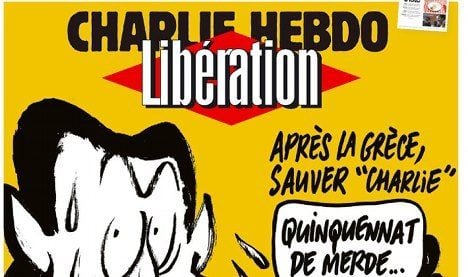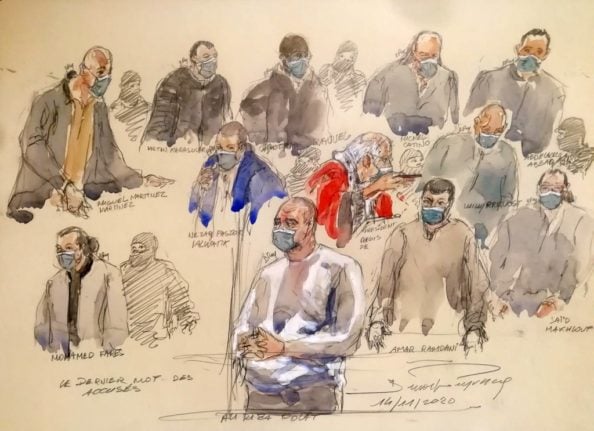Staff with Charlie Hebdo ran a series of cartoons in the latest edition of the left-leaning daily Libération, offering a humorous commentary on the attack that destroyed their offices on Wednesday.
“After Greece, save ‘Charlie’,” ran the headline on a front page drawing by ‘Catherine’, one of the papers’ cartoonists. Other cartoons featured on the first three pages of Libération.
The weekly’s staff are currently working out of the Libération offices, one of a number of expressions of support from journalists and politicians.
French politicians were quick to condemn the attack on Charlie Hebdo’s offices in Paris.
“Freedom of expression is an inalienable right in our democracy and all attacks on the freedom of the press must be condemned with the greatest firmness,” prime minister François Fillon said in a statement. “No cause can justify such an act of violence.”
Interior minister Claude Guéant told journalists at the scene: “Of course everything will be done to find the perpetrators of this attack, and this must certainly be called an attack.”
François Hollande, the socialist candidate in next year’s presidential election, also denounced the attack, saying in a statement: “No attack on liberty of the press can be accepted.”
The attack came the day Charlie Hebdo renamed the weekly newspaper Charia (Sharia) Hebdo and featured a front-page cartoon of the prophet saying: “100 lashes if you don’t die of laughter!”
The depiction of the prophet’s face is strictly prohibited in Islam.
The newspaper’s website also appeared to have been hacked on Wednesday: its regular home page had been replaced with a photo of the Grand Mosque in Mecca and a message reading: “No god but Allah”. The web site was later unavailable.
Police said the fire at the newspaper’s offices in eastern Paris started around 1am on Wednesday. No one was injured in the blaze, which a police source said had been caused by a petrol bomb.
The magazine’s publisher, known only as Charb, said he was convinced the fire was linked to the special edition.
“On Twitter, on Facebook, we received several letters of protest, threats, insults,” which had been forwarded to the police, he said.
“This is the first time we have been physically attacked, but we won’t let it get to us.”
In a statement, the satirical weekly said it was “against all religious fundamentalism but not against practising Muslims.”
“We are for the Arab Spring, against the winter of fanatics,” it said, adding later that all 75,000 copies of the edition had quickly sold out.
The weekly had said it would publish a special edition to “celebrate” the Ennahda Islamist party’s election victory in Tunisia and the transitional Libyan executive’s announcement that Islamic Sharia law would be the country’s main source of law.
It would feature the Prophet Muhammad as guest “editor”, the newspaper said.
As well as the cover cartoon, a back-page drawing featured Muhammad wearing a red nose and accompanied by the words: “Yes, Islam is compatible with humour.”
In 2007, a Paris court in 2007 threw out a suit brought by two Muslim organisations against Charlie Hebdo for reprinting cartoons of Muhammad first featured in Danish newspaper Jyllands-Posten. The cartoons had sparked angry protests by Muslims worldwide.
The Danish daily sent a message of solidarity to Charlie Hebdo Wednesday.
Lars Munch, who heads the media group that owns Jyllands-Posten, said in an interview published on the paper’s online edition that “it is terrible and completely unacceptable that a medium’s freedom of expression is threatened with violence.”
The head of the French Council of the Muslim Faith, Mohammed Moussaoui, also condemned the attack.
“If this was a criminal fire, we firmly condemn it,” he told AFP.
But the council also said in a statement that it condemned “the newspaper’s mocking tone with regards to Islam and its prophet.”
“Our problem now is to be able to put a paper out next Wednesday,” Charb said. “There is soot everywhere, the computers are in my opinion dead, the electrical system is melted.”



 Please whitelist us to continue reading.
Please whitelist us to continue reading.
Member comments